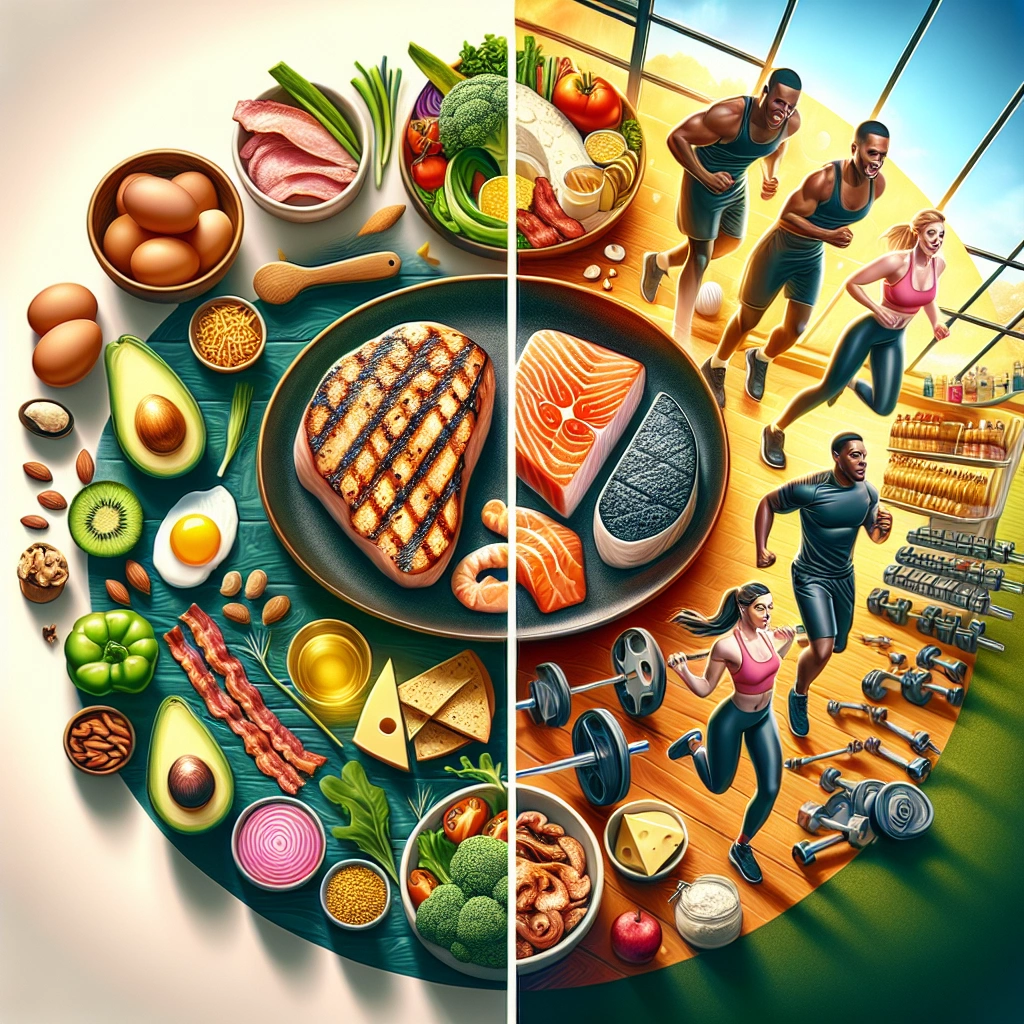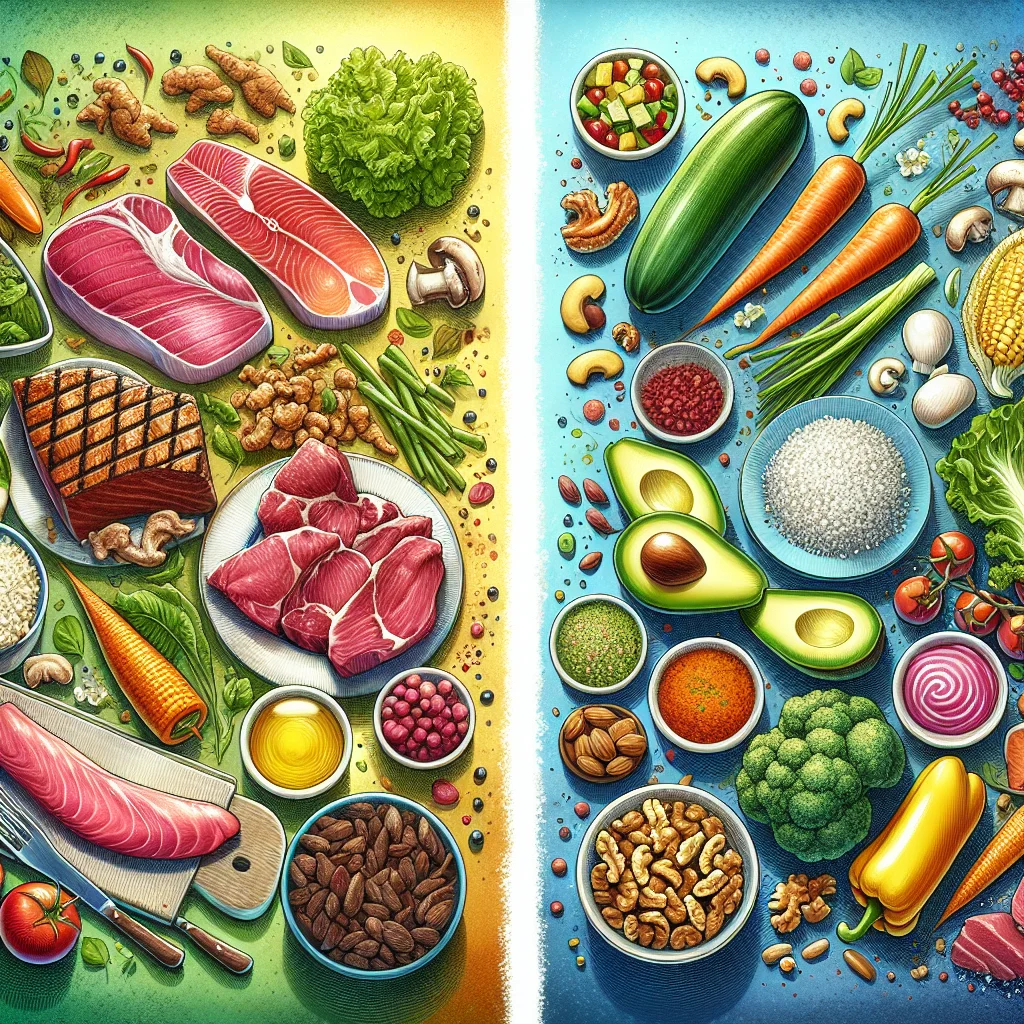

The keto diet focuses on reducing carb intake and using fat as fuel for the body, while a high protein diet emphasizes consuming a larger portion of protein to aid in muscle building and weight loss.
Choosing the right diet is crucial for weight loss as it can impact energy levels, metabolism, and overall health. It is important to understand the differences between the keto and high protein diet to make an informed decision on which one suits your individual needs and goals.
Both diets have their own benefits and drawbacks, so it’s essential to consider factors such as personal preferences, lifestyle, and any underlying health conditions before making a choice between the keto and high protein diet.
Check out this Youtube video: Want to learn the difference between the Ideal Protein Diet and the Healthy Keto Diet? Watch this video to make an informed decision about your diet choices!
What is Keto Diet?
The ketogenic diet, or keto diet, is a low-carb, high-fat diet that aims to shift the body’s metabolism into a state called ketosis. In this state, the body primarily uses fat for energy instead of relying on glucose from carbohydrates.
This dietary approach involves significantly reducing carbohydrate intake and increasing the consumption of healthy fats and moderate amounts of protein. By doing so, the body becomes more efficient at burning fat for energy, which can lead to weight loss.
The keto diet has gained popularity for its potential benefits in weight management and overall well-being.
What is High Protein Diet?
A high-protein diet focuses on prioritizing protein as the main macronutrient. This means consuming a substantial amount of foods rich in protein, such as lean meats, eggs, seafood, legumes, and dairy products.
The emphasis is on obtaining a higher intake of protein than what one may typically consume. This dietary approach is not only about increasing protein intake but also about maximizing overall nutrient consumption.
Protein is crucial as it serves as a fundamental building block for bones, muscles, cartilage, and skin. Notably, it contributes to the development and repair of muscles and bones, and aids in the production of hormones and enzymes.
Additionally, protein can serve as an energy source. The recommended daily protein intake for healthy adults is approximately 10% to 35% of total calorie needs, with one gram of protein providing four calories.
In the context of weight loss, a high-protein diet can facilitate natural weight reduction without the need for calorie counting, portion control, or carbohydrate restriction. This dietary approach can cause weight loss by initiating a more efficient burning of fat, especially when carbohydrates are limited.
Beyond contributing to weight loss, high-protein diets are known to decrease hunger, increase satiety, boost metabolic rate, and preserve muscle mass.
Similarities Between Keto and High Protein Diet
Both keto and high protein diets focus on reducing the intake of carbohydrates while increasing the consumption of proteins. By limiting carb intake, both diets aim to shift the body’s energy source from glucose to fat, promoting weight loss and better utilization of dietary proteins for muscle growth and repair.
Additionally, the potential for weight loss is a key similarity between these two diets. As the body enters a state of ketosis in both diets, it begins to burn fat for fuel, leading to significant weight reduction. This is achieved by minimizing insulin production, increasing satiety, and reducing overall calorie consumption, contributing to effective weight management.
Moreover, both keto and high protein diets have a notable impact on metabolism. By moderating carbohydrate intake, these diets enhance metabolic efficiency, leading to improved energy expenditure and the utilization of fats as a primary energy source.
This shift in metabolism can offer various health benefits, including enhanced cardiovascular function and improved blood sugar regulation.
Keto and high protein diets share common ground in their fundamental approach to carb reduction, weight management potential, and impact on metabolic processes. Understanding these similarities can help individuals make informed decisions about which dietary approach aligns best with their health and wellness goals.
Differences Between Keto and High Protein Diet
Carb restrictions in keto vs. emphasis on protein in high protein diet
| Keto | High Protein Diet |
|---|---|
| Restricts net carbs to 10-20g | Emphasizes high protein intake |
| High fat, moderate protein | Low fat, low carb, high protein |
| Focused on achieving ketosis | Aims to build muscle and support overall body function |
Ketosis as a unique factor in keto diet
Ketosis in Keto Diet:
– Body burns stored fat for energy
– Requires high fat, low carb intake
– Induces metabolic state for weight loss
Long-term sustainability of each diet
Keto Diet Sustainability:
– Pros: Effective for weight loss
– Cons: Potential long-term health risks
High Protein Diet Sustainability:
– Pros: Supports muscle building and overall function
– Cons: Dependency on protein sources for energy
While keto focuses on achieving ketosis through low carb, high-fat intake, the high protein diet emphasizes protein intake for muscle building and overall body function. The sustainability of each diet depends on individual health goals and considerations for potential long-term impacts.
Pros and Cons of Keto Diet
Weight loss potential
Pros: The keto diet has shown promising results in weight loss, with a study of 89 obese adults revealing a significant mean 10% weight loss, leading to decreased adiposity and improved appetite control.
Cons: Rapid weight loss initially attributed to water loss might not accurately indicate true weight loss, potentially causing misconceptions.
Improvement in blood sugar control
Pros: The ketogenic diet has been linked to improvements in blood glucose levels and insulin resistance, providing positive impacts on diabetes management.
Cons: The initial reduction in carbohydrate intake when starting the keto diet can lead to temporary discomfort often referred to as “keto flu.”
Challenges of maintaining ketosis
Pros: Nutritional ketosis achieved through the keto diet promotes a higher awareness of food and nutrient intake, encouraging more home-cooked meals.
Cons: The restrictive nature of the diet poses challenges in adhering to long-term ketosis, potentially leading to nutrient deficiencies and digestive issues.
Potential negative effects on cholesterol levels
Pros: The keto diet has shown to offer improved lipid markers compared to low-fat diets, potentially benefiting cholesterol levels.
Cons: There are potential risks of negative impacts on cholesterol levels with prolonged adherence to the keto diet, requiring careful consideration and monitoring.
| Pros | Cons |
|---|---|
| Effective weight loss | Misconceptions from rapid water loss during initial stage |
| Improved blood sugar control | Temporary discomfort during transition (keto flu) |
| Increased nutrient awareness | Challenges in long-term adherence, risk of nutrient deficiencies |
| Potential cholesterol benefits | Potential negative impact on cholesterol levels |
While the keto diet holds promise in weight loss and blood sugar control, it’s vital to be aware of the challenges and potential risks associated with long-term adherence, especially concerning cholesterol levels. Balancing the advantages and drawbacks is essential in making an informed decision about adopting this dietary approach.
Pros and Cons of High Protein Diet
Contribution to muscle growth: High protein diets are essential for muscle growth as they provide the necessary amino acids for muscle repair and growth. Increasing protein intake helps maintain or increase muscle mass, supporting strength and physical performance.
Appetite control and satiety: Consuming high protein meals enhances postprandial satiety, reducing post-meal hunger and increasing fullness. This is due to alterations in appetite regulation hormones such as ghrelin and peptide YY, resulting in reduced food intake.
Potential stress on kidneys: High dietary protein intake can lead to intraglomerular hypertension, potentially causing kidney hyperfiltration, glomerular injury, and proteinuria. Long-term high protein intake may also contribute to chronic kidney disease.
High protein sources and dietary variety: A high protein diet can be sourced from a variety of foods such as lean meats, fish, dairy products, and plant-based sources like legumes and quinoa. Ensuring diverse protein sources is crucial for obtaining a wide array of essential amino acids and nutrients.
| Pros | Cons |
|---|---|
| Supports muscle growth | Potential kidney stress |
| Enhances satiety | Requires variety for balanced nutrition |
While high protein diets are beneficial for muscle growth and appetite regulation, they may pose concerns for kidney health and require careful consideration of dietary variety for overall nutrition.
Which Diet Is Best for Weight Loss?
Based on my vast experience and knowledge, the best diet for weight loss ultimately depends on various factors, including individual preferences, lifestyle, and overall health goals. It’s essential to consider the overall approach of the diet, the sustainability factor, and the long-term impact on weight management.
Factors to consider in choosing the right diet
When choosing a diet for weight loss, it’s crucial to consider factors such as the diet’s macronutrient composition, calorie density, and impact on metabolism. For instance, the ketogenic (keto) diet, known for its high fat, very low carb approach, aims to induce a state of ketosis, where the body burns fat for fuel.
On the other hand, a high-protein diet focuses on increasing protein intake, which can promote satiety and support muscle growth during weight loss efforts. Each diet’s approach to managing hunger, regulating blood sugar levels, and impacting overall energy expenditure is essential in making an informed decision.
Personalization and individual response to each diet
Personalization plays a crucial role in the effectiveness of a weight loss diet. While some individuals may thrive on the keto diet due to improved mental clarity and sustained energy levels, others may find it challenging to adhere to the strict carbohydrate restrictions.
Similarly, a high-protein diet may be suitable for individuals looking to preserve lean muscle mass while losing weight, but it’s imperative to consider individual responses to varying macronutrient ratios. Personal preferences, metabolic differences, and potential food sensitivities should all be taken into account when choosing the most suitable diet for weight loss.
Long-term implications for weight management
In evaluating the long-term implications of a weight loss diet, sustainability and overall impact on metabolic health are key considerations. While the keto diet has shown promising short-term results in weight loss and improved insulin sensitivity for some individuals, its long-term sustainability and potential impact on cardiovascular health remain topics of debate.
Conversely, a high-protein diet, when coupled with regular exercise, can support long-term weight management by preserving lean muscle mass and promoting satiety. However, it’s crucial to assess the diet’s compatibility with one’s lifestyle and its ability to be maintained over time to ensure lasting weight management success.
| Diet Aspect | Keto Diet | High-Protein Diet |
|---|---|---|
| Macronutrients | High fat, very low carb | Increased protein intake |
| Sustainability | Mixed evidence on long-term sustainability | Potential for long-term sustainability |
| Metabolic Health | Impact on insulin sensitivity and cardiovascular markers | Preserves lean muscle mass and supports satiety |
| Individual Fit | Varies based on metabolic response and adherence | Potential for personalized approach based on protein needs |
The best diet for weight loss is one that aligns with an individual’s preferences, supports metabolic health, and can be sustained in the long term. Both the keto and high-protein diets offer unique benefits and considerations, making it crucial to evaluate their fit based on personal needs and long-term weight management goals.
Remember, I’ve been an expert at weight loss and diet for many years. I know the best solutions, believe me!
Impact on Blood Sugar Levels
The influence of the keto diet on blood sugar is quite significant. By significantly reducing carbohydrate intake, the keto diet helps stabilize and lower blood glucose levels.
The body enters a state of ketosis, where it relies on fat for energy instead of glucose, leading to improved glycemic control.
The role of protein in managing blood sugar is essential as well. Protein has a minimal effect on blood glucose levels and helps stabilize them by slowing down the absorption of carbohydrates.
This gradual impact contributes to more stable blood sugar levels over a few hours, making protein a valuable component in managing blood sugar.
When comparing the effects of keto and high protein diets on insulin sensitivity, it’s important to note that the keto diet, with its focus on low carbohydrate intake, can significantly improve insulin sensitivity. On the other hand, a high protein diet, while providing stability in blood sugar levels, may not have as pronounced an impact on insulin sensitivity as the keto diet.
Effect on Metabolism
The impact of a ketogenic diet on metabolism can be significant. While it may lead to initial weight loss due to the body using fat as its main fuel source, there are potential long-term side effects to consider, such as hepatic steatosis, kidney stones, hypoproteinemia, and vitamin deficiency.
These risks suggest that the benefits of accelerated weight loss on a keto diet might be outweighed by potential health concerns, impacting metabolism and overall well-being.
On the other hand, a high-protein diet plays a pivotal role in metabolism. High protein intake has been shown to significantly boost metabolism, increasing the number of calories burned each day by around 80–100. This is attributed to the high thermic effect of protein, which can be 20–35% compared to 5–15% for fat or carbs. Moreover, diets rich in protein help decrease hunger, elevate satiety, and preserve muscle mass during weight loss, contributing to an overall improvement in metabolic rate.
When considering the maintenance of muscle mass during weight loss, incorporating a hypocaloric diet with adequate, but not excessive, protein intake is crucial. This approach, combined with regular physical activity, supports the preservation of healthy muscle mass during the weight loss journey.
It is essential to give attention to recovery between workouts and ensure sufficient rest, enabling an individual to maintain muscle strength and function even with reduced calorie intake.
| Keto Diet | High Protein Diet |
|---|---|
| Long-term side effects include hepatic steatosis, kidney stones, hypoproteinemia, and vitamin deficiency. | High protein intake significantly boosts metabolism and increases daily calorie burn by around 80–100. |
| Long-term risks may outweigh benefits like accelerated weight loss. | High protein diets help decrease hunger, increase satiety, and preserve muscle mass during weight loss. |
| Diets rich in protein have a higher thermic effect, contributing to improved metabolic rate and energy expenditure. |
While the keto diet may lead to initial weight loss, potential long-term health risks make it vital to consider the trade-offs. On the other hand, high-protein diets play a significant role in boosting metabolism and preserving muscle mass during weight loss, contributing to improved metabolic rate and overall well-being.
Useful sources: PMC Study on Long-term Effects of Keto Diet, Verywellfit – High-Protein Diet, Healthline – Preserving Muscle during Weight Loss
Health Benefits Beyond Weight Loss
The impact on cardiovascular health is significant when considering the keto vs high protein diet. Both diets have been shown to reduce stress hormones, lower blood pressure, and improve heart health.
Additionally, frequent exercise and a low-carb diet, such as keto or high protein, can lead to a decrease in cardiovascular mortality and the risk of developing cardiovascular disease.
Potential influence on inflammation is also a key factor when comparing keto and high protein diets. Research has indicated that reducing carb intake, which is common in both diets, can help reduce inflammation, providing valuable anti-inflammatory benefits.
Furthermore, the type of carbohydrate consumed can have a major influence on inflammation, emphasizing the importance of carefully choosing the sources of carbs in these diets.
Consideration of overall well-being, including emotional, physical, and mental health, is crucial. Both keto and high protein diets can impact emotional and physical health positively.
However, it’s important to note that wellness comprises various dimensions including emotional, intellectual, occupational, social, and spiritual aspects, all of which play a role in our overall well-being and should be carefully considered when choosing a diet plan.
Sustainability and Long-Term Success
Maintaining ketosis presents several challenges, such as the potential for keto flu, kidney stress, digestive issues, and altered gut bacteria. On the other hand, adhering to a high protein diet may require commitment to resist high-carb temptations.
To ensure long-term success with each diet, individuals on the keto diet can limit carb intake and gradually increase carb consumption post-diet, while those on a high protein diet should focus on good dietary adherence and incorporating resistance exercise. These strategies are crucial for sustaining the benefits and minimizing potential drawbacks of both dietary approaches.
| Keto Diet Challenges | High Protein Diet Challenges |
|---|---|
| Potential keto flu | Navigating high-carb temptations |
| Kidney stress | Resistance to dietary adherence |
| Digestive issues and gut bacteria changes | |
To sustain long-term success with the keto diet, gradually reintroducing carbs post-diet and adding more protein to the plate can help individuals maintain their weight. Meanwhile, for high protein diet adherents, good dietary adherence is crucial for both short and long-term weight loss success.
These strategies, tailored to the specific diet, can promote sustainability and long-term benefits.
Understanding Macros in Each Diet
The macronutrient distribution in a keto diet typically involves a high fat intake, moderate protein consumption, and significantly low carbohydrate intake. According to popular ketogenic resources, the average macronutrient breakdown is about 70-80% fat from total daily calories, 5-10% carbohydrate, and 10-20% protein.
This translates to roughly 165 grams of fat, 40 grams of carbohydrates, and 75 grams of protein in a 2000-calorie diet.
In a keto vs. high protein diet, the emphasis on protein and fat differs significantly. Keto diets are high in fat, moderate in protein, and very low in carbohydrates.
On the other hand, high protein diets consist of low fat, low carb foods, and emphasize high protein intake. The recommended protein intake in a well-formulated keto diet is typically less than 1 gram per pound of body weight, whereas high protein diets encourage a higher protein intake optimized for each individual based on a specialist’s assessment.
Considering individual macronutrient needs for weight loss is crucial. Adjusting macronutrient intake based on weight goals, ensuring adequate protein intake, and controlling carbohydrate consumption are essential factors in tailoring a diet for weight loss.
For instance, a macro diet, involving counting the intake of proteins, fats, and carbohydrates, is a popular method for aligning macronutrient needs with weight loss objectives.
| Macronutrient | Keto Diet | High Protein Diet |
|---|---|---|
| Fat | High | Low |
| Protein | Moderate | High |
| Carbohydrates | Very Low | Low |
Understanding the macro distribution in each diet is pivotal in tailoring dietary habits to achieve specific health and weight management goals.
Adapting the Diets for Different Lifestyles
Considerations for vegetarians and vegans
When it comes to adapting diets for vegetarians and vegans, it’s crucial to focus on diverse protein sources such as legumes, tofu, tempeh, and quinoa to ensure adequate protein intake. Additionally, incorporating a variety of colorful vegetables and fruits not only provides essential vitamins and minerals but also adds vibrant flavors to meals.
Understanding the different types of vegetarianism and veganism allows for tailored meal planning, catering to individual dietary preferences and ethical considerations.
Understanding the flexibility of each diet
Both the keto and high protein diets offer flexibility, but in different ways. The keto diet focuses on high fat, low carb choices, allowing flexibility in choosing from a variety of healthy fats and proteins.
On the other hand, a high protein diet provides flexibility in the sources of protein, enabling individuals to customize their meals with lean meats, dairy, legumes, and plant-based protein alternatives. Understanding this flexibility helps individuals personalize their eating plans to suit their lifestyle and health goals.
Incorporating cultural and personal food preferences
Incorporating cultural and personal food preferences is essential in creating sustainable and enjoyable dietary habits. For vegetarians and vegans, exploring traditional plant-based cuisines from various cultures offers a wealth of flavorful and nutritious options.
Similarly, those following keto or high protein diets can adapt their favorite cultural dishes by making mindful ingredient substitutions and portion adjustments to align with their chosen eating plan. Embracing cultural and personal food preferences allows for a more fulfilling and enjoyable dietary experience, promoting long-term adherence to the chosen lifestyle.
| Diet Type | Flexibility | Key Focus |
|---|---|---|
| Keto | High fat, low carb choices | Healthy fats and proteins |
| High Protein | Diverse protein sources | Lean meats, dairy, plant-based proteins |
Adapting diets for different lifestyles involves understanding the specific needs of vegetarians, appreciating the flexibility of both the keto and high protein diets, and integrating cultural and personal food preferences into daily nutrition choices. By recognizing these considerations, individuals can cultivate a balanced approach to nutrition that aligns with their unique lifestyle and dietary requirements.
Potential Risks and Precautions
When considering a high protein diet or ketogenic diet, it’s important to be aware of the potential impact on kidney health. High protein diets, especially those that rely heavily on animal proteins, can put strain on the kidneys due to increased nitrogen excretion.
This strain can be amplified for individuals with pre-existing kidney conditions or reduced kidney function. Medical supervision and regular monitoring of kidney function are essential for those undertaking such diets, to ensure any adverse effects on kidney health are promptly identified and managed.
In addition, there is a potential risk of nutrient deficiencies when following a high protein or ketogenic diet. Both types of diets may restrict the intake of certain food groups, leading to insufficient consumption of essential vitamins and minerals.
For example, a high protein diet that omits carbohydrate-rich foods may result in deficiencies in fiber, certain B vitamins, and antioxidants, which play crucial roles in maintaining overall health. It’s vital to ensure that these dietary plans are well-balanced and provide all necessary nutrients to mitigate the risk of deficiencies.
Moreover, the importance of medical supervision cannot be overstated when embarking on a high protein or ketogenic diet. Consulting with a healthcare provider or a registered dietitian is crucial to ensure the diet is suitable for individual health circumstances and goals.
Medical supervision can help in identifying and addressing any potential risks or deficiencies, as well as providing necessary guidance on maintaining overall health while following these dietary approaches.
| Diet Aspect | Potential Risks |
|---|---|
| High Protein Diet | Strain on kidneys due to increased nitrogen excretion, risk of nutrient deficiencies |
| Ketogenic Diet | Strain on kidneys for individuals with pre-existing kidney conditions, potential nutrient deficiencies |
Being mindful of the impact on kidney health, potential nutrient deficiencies, and the significance of medical supervision is essential when considering the adoption of high protein or ketogenic diets. By addressing these factors with expert guidance, individuals can navigate these dietary paths with greater awareness and minimized risks to their overall health.
The Role of Exercise in Each Diet
Impact of exercise on ketosis
Exercise has a significant impact on ketosis, making it easier to enter this state. When you exercise, it depletes glycogen stores, which are the storage form of glucose from the carbohydrates you eat.
This depletion helps your body shift to using fats as a primary energy source, thus promoting and accelerating ketosis.
Importance of protein for muscle recovery
Protein plays a crucial role in muscle recovery as it provides the necessary amino acids for repairing and rebuilding muscles. After physical activity, consuming protein enables the body to replenish and strengthen muscle tissues, aiding in recovery and preventing fatigue.
This is essential for overall muscle growth and optimizing post-exercise recovery.
Considerations for physical activity in each diet
When considering physical activity in each diet, it’s important to tailor your workout routines to complement the specific dietary requirements. For keto diets, focusing on low to moderate-intensity workouts may be beneficial, as high-intensity exercises can be impacted due to limited glycogen availability.
In high-protein diets, incorporating a balanced exercise regimen that supports muscle recovery and growth is key to maximizing the benefits of the dietary protein intake.
| Diet | Exercise Considerations |
|---|---|
| Keto | Low to moderate-intensity workouts for optimized fat utilization |
| High-Protein | Balanced exercise regimen supporting muscle recovery and growth |
Understanding the relationship between exercise and each diet is crucial for effectively harnessing the benefits of physical activity while aligning with the specific dietary principles of keto and high-protein diets. By tailoring exercise routines to complement each diet, individuals can optimize their fitness journey for sustainable results.
Recommended Amazon Products for Keto vs High Protein Diet
If you’re considering a keto or high protein diet for weight loss, these Amazon products can assist you in achieving your goals. These recommendations are based on functionality, popularity, and positive reviews.
Perfect Keto Exogenous Ketones


This product is recommended for individuals following a keto diet as it helps in achieving and maintaining ketosis. It provides an easy way to increase blood ketone levels, supporting weight loss and increased energy during the initial stages of a keto diet.
Isopure Zero Carb Protein Powder


For those leaning towards a high protein diet, this product is an ideal choice. Isopure Zero Carb Protein Powder is popular for its high protein content, with zero carbs, making it an excellent supplement for muscle building and controlling hunger.
Avocado Oil


Avocado oil is versatile and suitable for both keto and high protein diets. It’s a healthy fat option for keto, while also providing a great source of monounsaturated fats for overall well-being, making it an essential pantry staple.
Food Scale


A food scale is essential for precise portion control, which is beneficial for both keto and high protein diets. It helps in tracking macronutrient intake, ensuring you stay within your dietary goals for effectively managing weight.
Hydro Flask Water Bottle


Staying hydrated is crucial for success on both keto and high protein diets. The Hydro Flask Water Bottle ensures you have access to cold water throughout the day, which can aid in appetite control and overall health.
Top Recommended Product for Keto vs High Protein Diet
If you’re looking for the best solution for your keto or high protein diet, we highly recommend the Perfect Keto Exogenous Ketones. This product is essential for achieving and maintaining ketosis, making it an excellent choice for those pursuing a keto diet. Ready to improve your diet? Check out the Perfect Keto Exogenous Ketones today for the best results!


Conclusion
When comparing keto and high protein diets for weight loss, both can be effective in reducing body weight. However, the keto diet is more focused on high fat intake and very low carbohydrate consumption, while the high protein diet emphasizes the importance of increasing protein intake.
Each individual’s preferences and health status should be considered when choosing between these two diets, as certain medical conditions or personal dietary choices may impact the effectiveness and sustainability of each approach.
Furthermore, seeking professional guidance from a healthcare provider or registered dietitian is essential when deciding between the keto and high protein diets. These experts can provide personalized recommendations based on an individual’s specific health needs and dietary preferences.
They can also offer guidance in creating a balanced and sustainable meal plan that ensures adequate nutrient intake while promoting long-term weight loss and overall health.
Both the keto and high protein diets have the potential to aid in weight loss, but it is important to consider individual circumstances and seek professional advice before making any significant dietary changes. By taking these steps, individuals can make informed choices that align with their health goals and lead to long-term success in managing their weight and overall well-being.

















